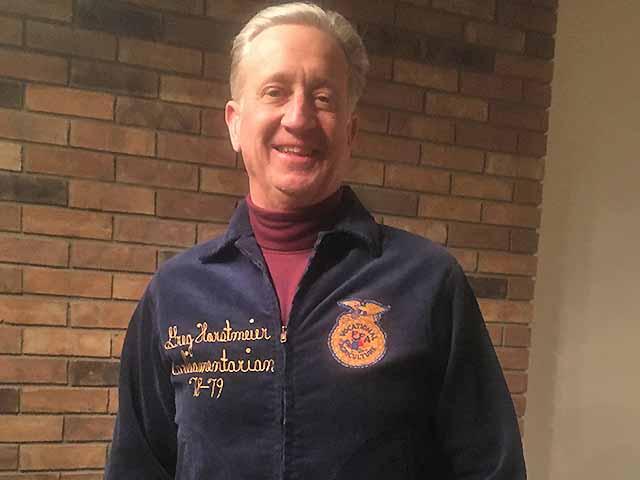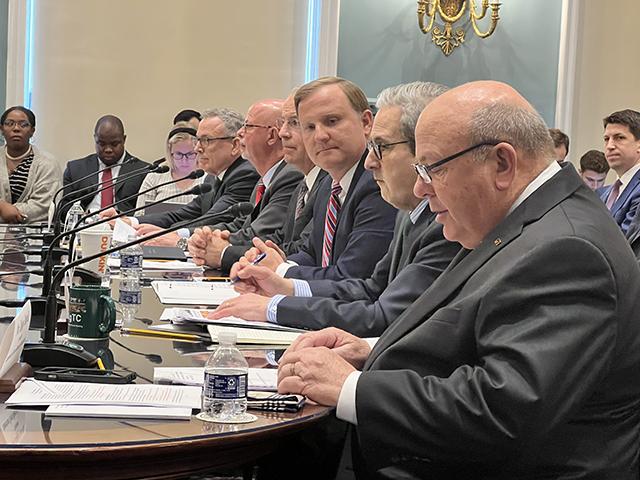Ag Groups Lay Out Regulatory Challenges
House Committee Votes to Repeal WOTUS Rule
WASHINGTON (DTN) -- While some farm group members told members of the House Agriculture Committee about regulatory burdens, another House committee on Tuesday advanced a joint resolution to overturn the Biden administration's waters of the United States (WOTUS) rule.
The House Transportation and Infrastructure Committee passed a resolution calling for the repeal of the WOTUS rule on a 30-22 vote under the Congressional Review Act. The resolution will now go to the House floor.
The Transportation Committee advanced the resolution while the House Agriculture Committee spotlighted regulations affecting farmers, including the WOTUS rule. When asked about his view of the rule under the Clean Water Act, Zippy Duvall, president of the American Farm Bureau Federation, called it "the largest land-grab of the federal government in history." Duvall said the changes in water rules from one administration to the next has become like a "ping-pong ball" for farmers and ranchers.
"Right now, we don't know what an ephemeral stream is and whether it is a navigable water or a significant nexus, " Duvall said, using some of the terms defined in the EPA rule.
At least 24 states have filed lawsuits against the Biden administration's water rule, while agricultural groups, including AFBF, have joined to intervene with those state cases. The lawsuits challenge the vagueness of the rule along with arguments that it attempts to greatly expand federal oversight of smaller and intermittent waterways.
Agricultural leaders talked about WOTUS before the House Agriculture Committee, which held its first hearing in the new Congress on regulatory problems facing farmers and the supply chain.
"The new rule impacts everyday activities that farmers must apply on their lands," said Michael Twining, representing the Agricultural Retailers Association at Tuesday's hearing.
Duvall also noted most of agriculture also is waiting on the U.S. Supreme Court ruling on the Sackett v. EPA case -- a long-standing court battle over a water permit -- that also could force the Biden administration to withdraw the new rule and start over, depending on the ruling.
"We are waiting on the Supreme Court ruling and hope that will help us out," Duvall said.
(Also see "WOTUS Now Challenged by 24 States Plus Several Ag Groups in Two Different Federal Courts" here: https://www.dtnpf.com/….)
LIST OF REGULATORY CONCERNS
Waters of the U.S. was just one of multiple regulatory issues raised in the House Ag hearing, which included leaders in agricultural transportation, fertilizer, agricultural retail and poultry processing as well as Duvall and National Farmers Union President Rob Larew.
RIGHT TO REPAIR
Larew fielded most of lawmakers' questions about the right to repair equipment. The right-to-repair debate is a circumstance where the Biden administration and Congress have not yet stepped in to regulate. Farmers continue to be limited by manufacturers on where they can get equipment fixed.
At least 11 states have introduced legislation that would expand right-to-repair options for farmers and people in other industries. State lawmakers advanced a bill out of the Colorado House last week that would require manufacturers to share coding and manuals with independent repair shops.
"Farmers currently, for many procedures, are not allowed to touch or get the access code to fix any of their equipment," Larew said, adding farmers often have to wait for a repair person from the dealership who knows the necessary coding.
Asked again about the issue later, Larew said that right now, there are a "patchwork" of rules and agreements that haven't resolved the issue.
"Farmers like their independence. They like to repair things on their own. They like to innovate."
P[L1] D[0x0] M[300x250] OOP[F] ADUNIT[] T[]
(Also see "Colorado's House Passes Bill Giving Farmers Right to Repair Ag Equipment" here: https://www.dtnpf.com/….)
SEC'S SCOPE 3 RULE
Rep. Frank Lucas, R-Okla., pointed to the Securities and Exchange Commission (SEC) proposed rule that would require public companies to report the greenhouse gas emissions of their supply chain. Dubbed the "Scope 3" rule, the proposal is meant to hold companies accountable for their emission-reduction claims. Lucas called it a "deeply flawed rule" that would end up ensnaring farmers.
Duvall agreed, saying the rule risks putting paperwork burdens on small- and medium-sized farm and ranch operations.
"Scope 3 would put a heavy book-keeping burden on our farmers," Duvall said. He added, "It's something we need to stop before it gets going."
At least 117 lawmakers wrote the SEC chairman last year, raising concerns that the rule would increase costs for farmers.
On the compliance costs, Duvall said, "It will be passed on to farmers. I can promise you that."
FERTILIZER PERMITTING NEEDS
Corey Rosenbusch, president and CEO of the Fertilizer Institute, noted fertilizer prices have taken "center stage" over the past year due to high prices that have come down in recent months.
In terms of trying to boost fertilizer production domestically, the biggest need is permitting reform. He pointed to a situation where a phosphate mine has spent $32 million and 10 years trying to open. He noted, "Fertilizer plants are capital-intensive facilities," with some projects costing as much as $4 billion.
Rosenbusch also called on Congress to push the U.S. Geological Survey to include potash and phosphate on the agency's list of minerals critical to national security.
Rosenbusch also pointed to the need to expand rail service, increase the number of truck drivers, and continue investments in waterways infrastructure as well.
Asked whether the Biden administration is doing enough to expand the capacity for natural gas production, Rosenbusch said that's a question for the energy industry but added, "Fossil fuels are a critical part of food and agriculture, and so we do need to be more aggressive in allowing our gas producers to expand production."
Rosenbusch cited the geopolitical challenges of fertilizer with Russia and Belarus being major exporters and China restricting exports as well. A congressman also asked whether the federal government should make a major investment to increase fertilizer production.
"I think our companies are adequately equipped to make those investments," Rosenbusch said. He added, "I believe they can make those investments" if the permitting rules allow it.
The Biden administration is spending $500 million to boost domestic production of fertilizer. The Ag Department is expected to soon announce grants and loans to as many as 21 projects identified earlier this year for funding.
Larew sat next to Mike Brown, president of the National Chicken Council. The two had opposing views on the Biden administration's proposed rules on the Packers and Stockyards Act.
Brown cited some of the history behind the three proposed rules, which were all part of a single larger rule in the Obama administration. The rule was set aside under the Trump administration. The debate goes back to the 2008 farm bill, in which a lot of the language in the rules was not in the final bill that was signed into law.
"Congress never authorized these GIPSA (Grain Inspection, Packers and Stockyards Administration) rules, Brown said, adding "We hope they are never enacted."
Brown said the poultry industry is a model of efficiency, but "overzealous and misguided regulations" threaten to take chicken off the menu.
In his written testimony, Brown said the rule would dismantle the poultry industry's contract system. He said the contracting system between poultry companies and growers "has evolved to efficiently allocate economic risk to the parties best prepared to burden it."
The proposed rules would require poultry companies to provide growers with more transparent information about their payment contracts. The rules would also tighten definitions on issues of discrimination, retaliation and deceptive practices by meatpackers.
Larew pointed to price-fixing litigation against the meatpackers and poultry integrators. He also called for a competition title in the farm bill to tighten Packers and Stockyards enforcement. "The proposed rules from USDA are sorely needed," Larew said in his written testimony.
Larew also pointed out the current Packers and Stockyards rule limits the ability of an individual producer to sue a meatpacker over discriminatory practices because courts have maintained the rule means producers "have to prove harm to the industry."
Rep. Rick Crawford, R-Ark., said GOP lawmakers last fall sent a letter to USDA on the proposed livestock rules, making the case they fall under the "major questions doctrine," a phrase from a Supreme Court decision last year involving the EPA that will become a more frequent legal argument against federal rules.
POULTRY LINE SPEEDS
Brown also warned against a push by groups to require USDA to slow down line speeds at chicken processing plants.
Poultry plants have been operating line speed processing up to 175 birds a minute under a pilot and waiver program going back to the Clinton administration. Historically, line speeds for plants have been set at 140 birds per minute.
After nearly 25 years, USDA is now conducting a study on line speeds in response to a lawsuit by labor groups. Brown said data shows that food safety at higher line speeds has been equivalent or better, and worker safety has not been compromised. Brown also pointed out that other countries run line speeds at 220 birds a minute or higher.
The examination of the line speeds also comes as the U.S. chicken industry lays claims to record demand both domestically and in exports.
Forcing poultry plants to slow down line speeds would affect the prices consumers pay for chickens, as well as the number of flocks or birds a producer would be allowed to grow at one time.
WAGE RATES FOR H-2A
The hearing also had multiple questions about challenges with H-2A workers, including wages and the new Adverse Effect Wage Rate (AEWR).
The new rule proposes a 14% wage rate increase for H-2A workers.
Duvall questioned the survey that the U.S. Labor Department uses to set those wages. "We think that wage rate survey is flawed," Duvall said.
The Agriculture Workforce Coalition (AWC) also cited that it is "deeply concerned" about AEWR. The group noted the "new calculation dramatically increases costs for producers utilizing the program and will place an undue burden on family farms, which are already facing a multitude of challenges, including the impact of high input costs, foreign competition, market volatility, and adverse weather. It will make it difficult for farmers to remain competitive and will serve only to further increase costs for domestically produced agricultural products."
Chris Clayton can be reached at Chris.Clayton@dtn.com
Follow him on Twitter @ChrisClaytonDTN
(c) Copyright 2023 DTN, LLC. All rights reserved.




